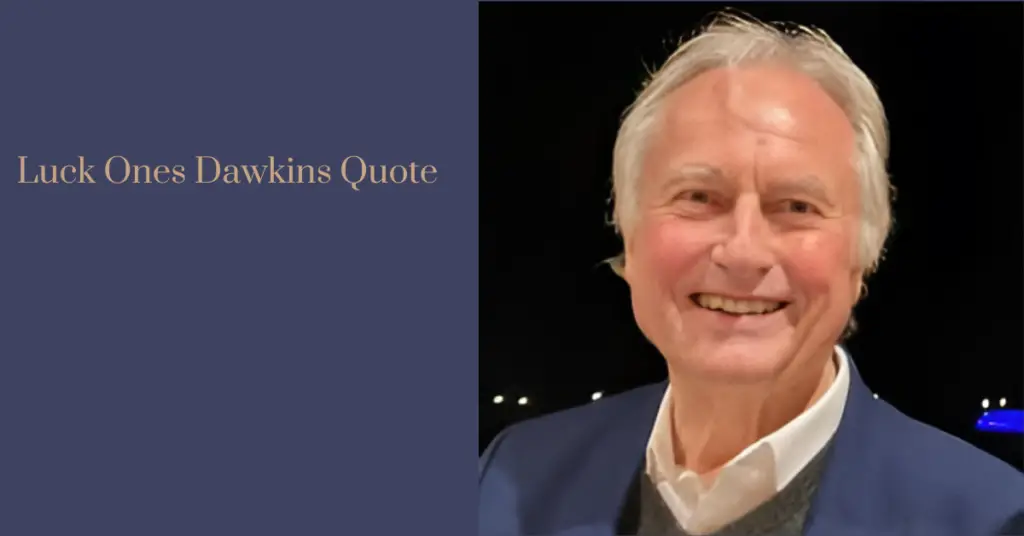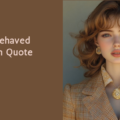Introduction
Luck Ones Dawkins Quote is one of those phrases that hits deep. Richard Dawkins has a unique way of making us reflect on life. His words often make us stop and think.
The Luck Ones Dawkins Quote challenges our views on life and death. It brings us closer to understanding the value of our existence. Dawkins often explores the idea that life is fleeting. We only have a limited time, and that makes us lucky.
He once said, “We are going to die, and that makes us the lucky ones.” This quote is both profound and thought-provoking. It pushes us to reconsider our everyday struggles. I
nstead of worrying about the small things, we should focus on appreciating life. We are the lucky ones who die, because we get to live, love, and experience.
Dawkins challenges us with statements like, “Are we lucky to be alive?” The fact that we are here at all is a rare gift. It’s something worth cherishing.
In his work, especially in Unweaving the Rainbow poem, he reveals how many humans never get to exist. “Most humans who could exist never will,” he writes. This perspective shifts the way we see life and death.
In this blog post, we will dive deeper into these fascinating thoughts. Let’s explore how Dawkins’ view of life, death, and luck can inspire us to live more fully.
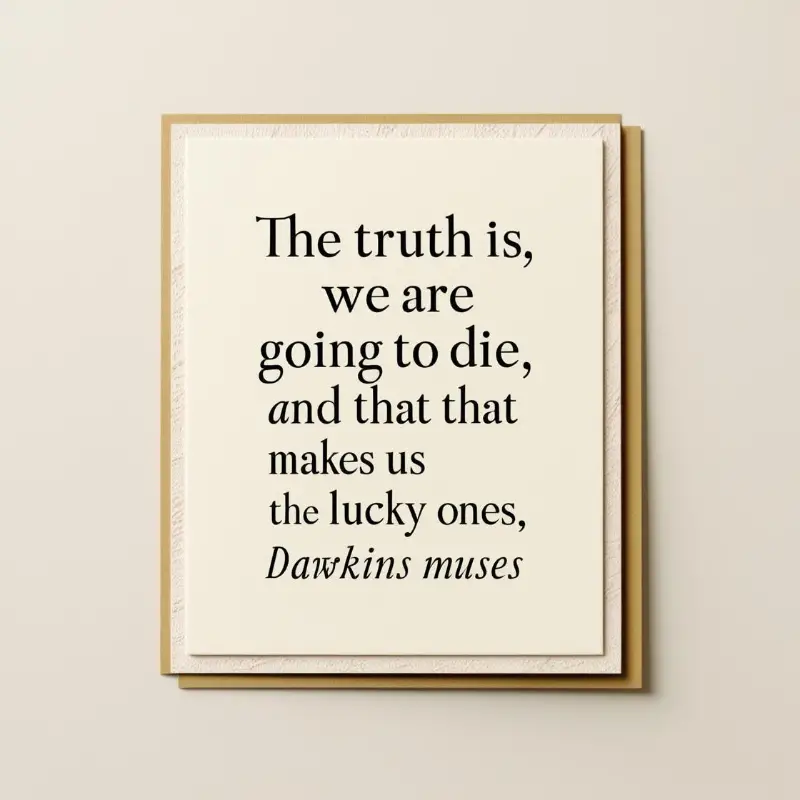
Reflections on Life and Death: The Luck of Being Alive
- “The truth is, we are going to die, and that makes us the lucky ones, Dawkins muses.”
This Luck Ones Dawkins Quote resonates with We are going to die, and that makes us the lucky ones, reminding us that our mortality gives meaning to life. - “We are all atheist quotes remind us that our brief existence is a fortunate one, Dawkins reflects.”
An enlightening thought that ties into We are the lucky ones who dies, suggesting that atheism underscores the preciousness of life. - “In his words, Dawkins challenges us to consider: Are we lucky to be alive?”
This aligns with Are we lucky to be alive, prompting deep introspection about the uniqueness of our existence. - “Dawkins writes, ‘Most humans who could exist never will, making our lives a rare gift.'”
This thought connects with Most humans who could exist never will, underscoring how fortunate we are to experience life. - “The realization that we are going to die, Dawkins argues, makes us the lucky ones.”
A reflection that aligns with We are going to die, and that makes us the lucky ones, emphasizing the fleeting nature of existence. - “Dawkins’ assertion that we are the lucky ones who dies reflects the profound value of life.”
This ties into We are the lucky ones who dies, suggesting that our limited time on earth gives life its depth. - “Are we lucky to be alive? Dawkins urges us to confront this question as we reflect on our mortality.”
A thought-provoking question connected to Are we lucky to be alive, prompting us to appreciate the brevity of life. - “Dawkins reflects that in the grand scheme of things, most humans who could exist never will.”
An insight that ties into Most humans who could exist never will, urging us to value the rarity of our existence. - “Dawkins touches on the irony of life, stating that we are lucky precisely because we will die.”
This resonates with We are going to die, and that makes us the lucky ones, suggesting mortality gives life meaning. - “As Dawkins explores the idea of atheism, he points out that the fact that we exist is a rare blessing.”
This connects with We are all atheist quotes, reminding us that even without a divine plan, life itself is extraordinary. - “The luck of being alive, Dawkins notes, is made more poignant by our inevitable end.”
This quote aligns with We are going to die, and that makes us the lucky ones, showing how our awareness of death enhances our appreciation of life. - “In Unweaving the Rainbow poem, Dawkins reveals how science and the finite nature of life shape our understanding of the universe.”
This ties into the Unweaving the Rainbow poem, offering a literary reflection on how science illuminates the preciousness of existence. - “Dawkins’ musings about atheism suggest that being alive is a lucky accident of the universe.”
This relates to We are all atheist quotes, reflecting Dawkins’ view that life is a rare phenomenon in an indifferent universe. - “Dawkins observes that the beauty of life is amplified by its impermanence and the fact that we are lucky to experience it.”
This connects to Are we lucky to be alive, exploring how our awareness of death enhances our perception of life. - “Dawkins’ reflections on the human experience remind us that most humans who could exist never will, making our existence extraordinary.”
A powerful statement linked to Most humans who could exist never will, underscoring the rarity of human life.
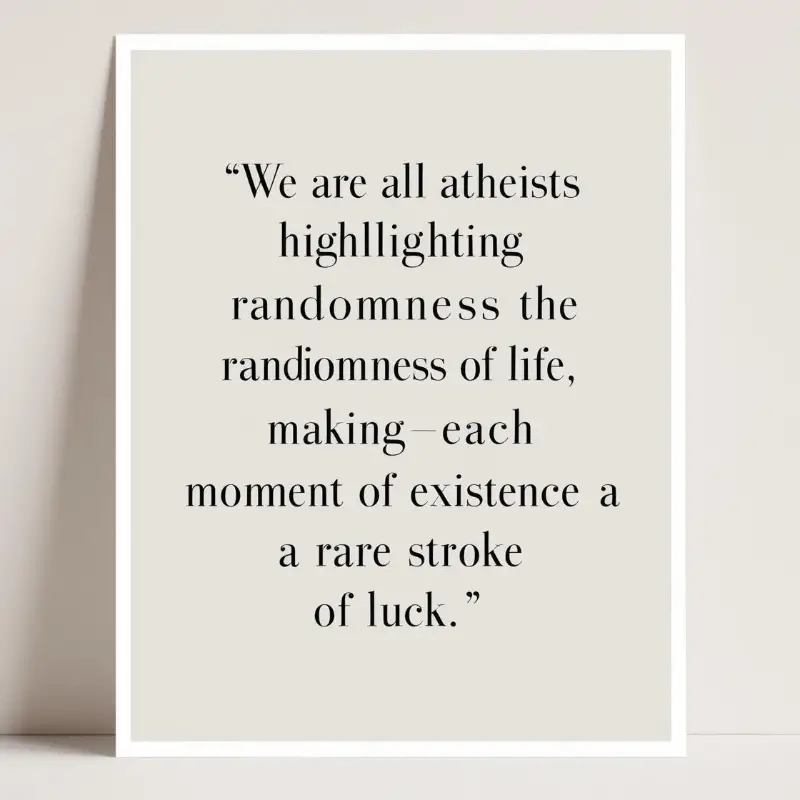
The Fragility of Existence and the Question of Luck
- “In contemplating mortality, Dawkins suggests we are the lucky ones who die because we are aware of our fleeting nature.”
This quote aligns with We are the lucky ones who dies, emphasizing the awareness of our mortality as a key part of being fortunate. - “We are all atheist quotes highlight the randomness of life, making each moment of existence a rare stroke of luck.”
This resonates with We are all atheist quotes, showcasing how life, despite lacking divine purpose, is a beautiful accident. - “Dawkins often poses the question, ‘Are we lucky to be alive?’ challenging us to reconsider the value of life in the face of death.”
A powerful thought connected to Are we lucky to be alive, urging us to reflect on the inherent luck of our existence. - “Dawkins’ reflection on human existence reminds us that most humans who could exist never will.”
This ties into Most humans who could exist never will, highlighting the rare opportunity we have to experience life. - “The fact that we are going to die, Dawkins argues, is what makes life worth living and why we are the lucky ones.”
This connects with We are going to die, and that makes us the lucky ones, suggesting that our mortality gives life urgency and meaning. - “Dawkins suggests that it’s not just life that’s rare, but our awareness of death that makes us the lucky ones who die.”
A thought-provoking idea tied to We are the lucky ones who dies, emphasizing how the knowledge of our impermanence shapes our experience. - “As Dawkins writes, ‘Most humans who could exist never will,’ and this rarity is why we must cherish our lives.”
This aligns with Most humans who could exist never will, encouraging us to appreciate the fleeting nature of existence. - “Dawkins reflects that our finite time on earth is what makes us lucky, as it pushes us to live with purpose.”
A statement that connects with We are going to die, and that makes us the lucky ones, showing how death gives life meaning. - “In his exploration of atheism, Dawkins writes that life itself is a miracle, making us lucky to be alive.”
This ties into We are all atheist quotes, offering a reflection on how the absence of divine intervention only heightens life’s rarity. - “Dawkins remarks that our awareness of death is what makes us the lucky ones who die, as it compels us to live fully.”
This resonates with We are the lucky ones who dies, illustrating how death enhances the richness of life. - “The message from Dawkins is clear: We are lucky to be alive because most humans who could exist never will.”
This ties into Most humans who could exist never will, reminding us of the preciousness of our existence. - “Dawkins reminds us that even in atheism, life is a rare gift, and we are the lucky ones who die because we get to experience it.”
This aligns with We are all atheist quotes, suggesting that even without a higher power, life is an extraordinary opportunity. - “The knowledge of our inevitable death, Dawkins suggests, is what gives us the ability to truly appreciate life.”
This connects with We are going to die, and that makes us the lucky ones, reinforcing the idea that mortality enhances the beauty of existence. - “Dawkins’ reflections on atheism challenge us to see the fragility of life as the very reason we are lucky to be alive.”
This aligns with We are all atheist quotes, showing how our awareness of life’s fragility enhances its value. - “In his famous Unweaving the Rainbow poem, Dawkins captures how science can deepen our appreciation for the rare gift of life.”
This connects with Unweaving the Rainbow poem, showing how understanding life through a scientific lens reveals its wonder.
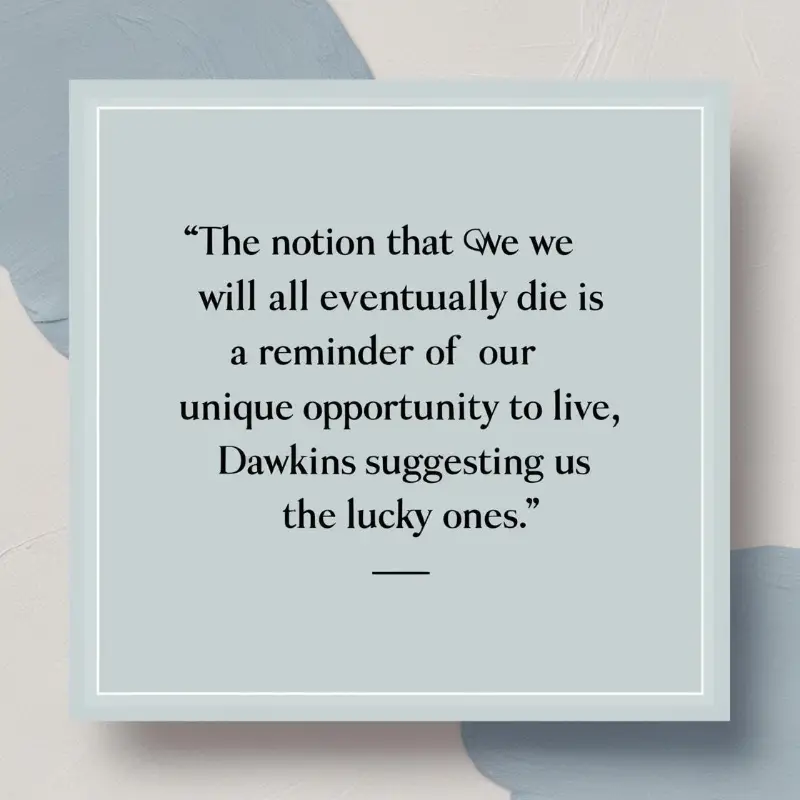
Embracing Life’s Fragility Through Mortality
- “Dawkins argues that life’s impermanence makes it all the more precious, suggesting that we are the lucky ones simply by existing.”
This connects with the Luck Ones Dawkins Quote, as the awareness of our eventual death heightens the significance of our existence. - “The notion that we will all eventually die is a reminder of our unique opportunity to live, Dawkins suggests, making us the lucky ones.”
This resonates with the Luck Ones Dawkins Quote, pointing out that understanding death adds an urgency to how we experience life. - “Dawkins contends that in the grand scheme of things, the realization that we die one day is what makes our lives extraordinary.”
This aligns with the Luck Ones Dawkins Quote, highlighting how the certainty of death enhances the meaning of life. - “The fleeting nature of life, according to Dawkins, invites us to live with purpose, knowing that we are the lucky ones who get to experience it.”
This connects with the Luck Ones Dawkins Quote, as the shortness of our lives is what makes every moment feel valuable. - “Dawkins explores how the awareness of our mortality leads to a deeper appreciation for the time we have, marking us as the lucky ones.”
This ties into the Luck Ones Dawkins Quote, where the understanding of our inevitable death enriches our ability to cherish life. - “In his reflections, Dawkins makes the case that the finite nature of life is what makes it worth living—it’s the very thing that makes us the lucky ones.”
This relates to the Luck Ones Dawkins Quote, as mortality is a defining feature of the human experience that makes life precious. - “The certainty of death, Dawkins argues, makes life more meaningful. It’s this awareness that reveals us as the lucky ones, granted the opportunity to live.”
This is tied to the Luck Ones Dawkins Quote, suggesting that the realization of death adds depth to the experience of life. - “Dawkins suggests that life’s rarity is what makes it so valuable. Recognizing we are all going to die adds an extra layer of significance to our existence.”
This is closely tied to the Luck Ones Dawkins Quote, which emphasizes how the awareness of death makes life more meaningful. - “Through the lens of mortality, Dawkins points out that the very fact we are alive, despite life’s briefness, makes us the lucky ones.”
This connects to the Luck Ones Dawkins Quote, where the awareness of life’s finiteness leads us to see it as a rare and fortunate experience. - “Dawkins frequently highlights how awareness of death fuels a deeper appreciation of life. It’s the fact we know we’ll die that makes us the lucky ones.”
This resonates with the Luck Ones Dawkins Quote, showing how mortality is the key to recognizing the value of living.
The Beauty of Life’s Fleeting Moments
- “In Dawkins’ perspective, it is the certainty of death that makes life meaningful, marking us as the lucky ones who are able to experience it.”
This connects with the Luck Ones Dawkins Quote, which emphasizes how mortality imparts meaning to every living moment. - “The acknowledgment that death is inevitable gives life its urgency, Dawkins suggests, which is why we are the lucky ones to be alive.”
This is tied to the Luck Ones Dawkins Quote, showing that understanding death makes life more purposeful. - “Dawkins reflects on the rare gift of life, noting that the inevitable end gives our existence profound meaning, making us the lucky ones.”
This resonates with the Luck Ones Dawkins Quote, underlining how the awareness of death enhances the value of life. - “According to Dawkins, the briefness of life is what makes it remarkable. We are fortunate to experience it, even though it is fleeting.”
This aligns with the Luck Ones Dawkins Quote, highlighting that life’s shortness is what makes it special and valuable. - “Dawkins encourages us to embrace life, knowing that its fragility is what makes it a gift, marking us as the lucky ones.”
This reflects the Luck Ones Dawkins Quote, where the impermanence of life enhances our appreciation for it. - “Life’s fleeting nature is something that Dawkins sees as an essential part of its beauty. Our eventual death, he argues, makes us the lucky ones.”
This connects with the Luck Ones Dawkins Quote, reinforcing the idea that mortality is what makes life precious. - “Dawkins suggests that life is a rare occurrence, and its briefness is what makes us the lucky ones who get to experience it.”
This ties into the Luck Ones Dawkins Quote, pointing out that the rarity of life itself contributes to its worth. - “The awareness of mortality, Dawkins notes, is not a grim reality but a reason to live more fully, knowing that we are the lucky ones who get to be alive.”
This resonates with the Luck Ones Dawkins Quote, showing that the knowledge of death encourages us to live more intentionally. - “Dawkins believes that the simple fact of being alive, in spite of death’s certainty, is what makes us the lucky ones. Life itself is a rare and precious gift.”
This aligns with the Luck Ones Dawkins Quote, emphasizing that life’s rarity is what makes it extraordinary. - “As Dawkins puts it, it’s our knowledge of death that makes us the lucky ones. It’s this awareness that allows us to savor life’s fleeting moments.”
This connects with the Luck Ones Dawkins Quote, showing how the certainty of death enhances the appreciation of life.
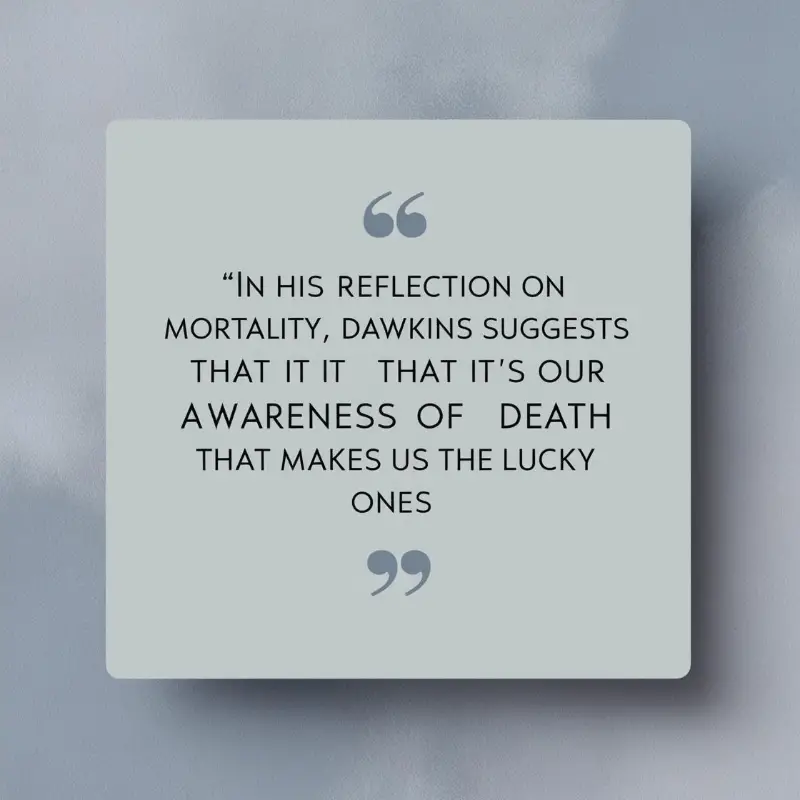
The Preciousness of Existence: Life, Death, and the Question of Luck
- “In his reflection on mortality, Dawkins suggests that it is our awareness of death that makes us the lucky ones.”
This insight resonates with We are going to die, and that makes us the lucky ones, where understanding the inevitability of death gives deeper value to the time we have. - “Dawkins writes that ‘we are the lucky ones who die,’ not in the sense of celebrating death, but in how it makes life more meaningful.”
A powerful thought that aligns with We are the lucky ones who dies, explaining how the awareness of mortality shapes the richness of life. - “We are lucky to be alive, Dawkins argues, because life is so rare and fleeting, and we should cherish every moment.”
This reflects Are we lucky to be alive, urging us to appreciate the unique experience of being alive, given that so many never get that chance. - “Dawkins contemplates the idea that ‘most humans who could exist never will,’ making our lives a truly exceptional gift.”
This is closely tied to Most humans who could exist never will, emphasizing how the rare nature of our existence adds to our luck. - “Dawkins shares a powerful message: the recognition of death’s certainty is what gives us the privilege of being the lucky ones.”
This mirrors We are going to die, and that makes us the lucky ones, showing that our finite time on earth is what makes it so valuable. - “In exploring atheism, Dawkins emphasizes that life, despite the lack of a divine purpose, is a fortunate and extraordinary occurrence.”
This idea ties into We are all atheist quotes, reflecting how even without religious beliefs, life itself holds incredible meaning. - “The question of whether we are lucky to be alive is one Dawkins regularly addresses, reminding us of the fragility and rarity of our existence.”
This connects with Are we lucky to be alive, urging readers to ponder the question of our extraordinary but temporary existence. - “Dawkins highlights that the transient nature of life makes us more fortunate for experiencing it, as most life forms never get the opportunity.”
A direct reference to Most humans who could exist never will, underscoring how rare and valuable our existence is. - “We are the lucky ones who die, Dawkins reflects, because our awareness of death makes life more precious and full of purpose.”
This aligns with We are the lucky ones who dies, suggesting that knowing we won’t last forever compels us to live with intent. - “Dawkins points out that the beauty of life lies in its fleeting nature, making us fortunate to experience it, even as atheists.”
This resonates with We are all atheist quotes, showing how the absence of divine meaning doesn’t diminish the wonder of life. - “The notion of death makes us appreciate life more, as Dawkins asserts, further reinforcing the idea that we are lucky to be alive.”
This connects with We are going to die, and that makes us the lucky ones, pointing out how our mortality enriches our lives. - “Through his examination of atheism, Dawkins reminds us that life’s preciousness is enhanced by the very fact that it will end.”
A thought that ties into We are all atheist quotes, reinforcing the idea that life is a beautiful but brief phenomenon. - “Dawkins reflects that ‘Unweaving the Rainbow poem’ highlights how understanding science adds to the appreciation of the rare miracle that is life.”
This quote ties into Unweaving the Rainbow poem, illustrating how science and death give life more meaning and importance. - “Most humans who could exist never will, Dawkins notes, and this reality serves as a reminder that we are extraordinarily lucky to experience life.”
This is directly related to Most humans who could exist never will, pointing to the rarity of life as the key reason we are lucky to be alive. - “In examining the impermanence of life, Dawkins concludes that being alive at all is a stroke of luck, heightened by the certainty of our eventual death.”
This aligns with We are going to die, and that makes us the lucky ones, emphasizing how our awareness of death makes life even more valuable.
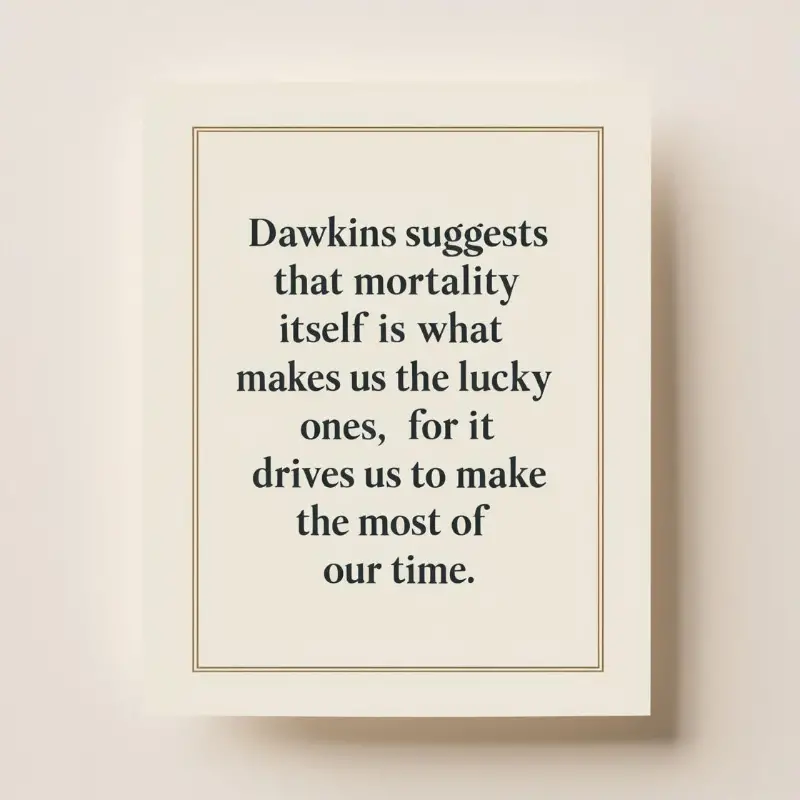
The Gift of Life: Mortality and the Idea of Being Lucky
- “Dawkins suggests that mortality itself is what makes us the lucky ones, for it drives us to make the most of our time.”
This connects with We are going to die, and that makes us the lucky ones, showing how death adds urgency and meaning to life. - “We are the lucky ones who die, Dawkins claims, because understanding our mortality gives us the opportunity to truly live fully.”
This idea reinforces We are the lucky ones who dies, showing how the certainty of death leads us to embrace life more deeply. - “In his works, Dawkins often raises the question, ‘Are we lucky to be alive?’ reflecting on the rarity of human existence in the grand scope of the universe.”
A direct reflection of Are we lucky to be alive, urging us to consider how rare and extraordinary life really is. - “Dawkins underscores the fact that life is a gift, and the privilege of being alive makes us the lucky ones in a universe where most will never exist.”
This ties back to Most humans who could exist never will, highlighting the preciousness of life in an indifferent universe. - “Dawkins reflects that the brevity of life makes it all the more precious, suggesting that we are lucky precisely because we will die.”
This directly connects with We are going to die, and that makes us the lucky ones, reiterating how life’s impermanence adds to its value. - “Dawkins notes that even if we are atheists, we can appreciate the beauty of life and the incredible luck of being alive.”
This aligns with We are all atheist quotes, highlighting how atheism does not diminish the wonder of life. - “Through his reflections, Dawkins urges us to cherish life, as the realization that we will die makes us the lucky ones.”
A powerful thought that ties into We are going to die, and that makes us the lucky ones, reinforcing the idea that death makes life precious. - “In considering the rarity of life, Dawkins remarks that most humans who could exist never will, making each life an exceptional gift.”
This directly connects to Most humans who could exist never will, underscoring how rare and valuable human life is. - “Dawkins points out that understanding the fragility of life, and the inevitability of death, leads us to appreciate the extraordinary gift of being alive.”
This resonates with We are going to die, and that makes us the lucky ones, emphasizing the value of life in light of death. - “The fact that we will die, Dawkins suggests, is what makes us lucky, as it gives life meaning and purpose.”
This aligns with We are going to die, and that makes us the lucky ones, showing how mortality drives us to live more meaningfully. - “In his exploration of atheism, Dawkins affirms that life is a rare occurrence, and our awareness of death makes us appreciate it more.”
This connects with We are all atheist quotes, showing how even without divine purpose, life’s rarity is what makes it extraordinary. - “Dawkins invites us to consider that mortality itself is a reason for us to feel lucky, as it adds weight and significance to every moment.”
This ties back to We are going to die, and that makes us the lucky ones, suggesting that mortality makes life more significant. - “Dawkins reflects on how most humans who could exist never will, and in doing so, underscores how fortunate we are to experience life.”
This directly connects to Most humans who could exist never will, urging us to appreciate the rarity of our lives. - “In his writing, Dawkins captures the essence of life’s fleeting nature and encourages us to see it as a blessing, made more precious by the certainty of death.”
This aligns with We are going to die, and that makes us the lucky ones, reinforcing the idea that death enhances life’s value.
Cherishing Life: The Intersection of Mortality and Gratitude
- “Dawkins writes that we are lucky to be alive because, in the grand scope of things, the very fact of our existence is rare and fleeting.”
This aligns with We are going to die, and that makes us the lucky ones, emphasizing how our mortality enhances the preciousness of life. - “The realization that most humans who could exist never will is a sobering reminder of how lucky we are to have the privilege of life.”
This connects with Most humans who could exist never will, urging us to recognize the uniqueness of our existence. - “Dawkins’ perspective on atheism invites us to see that life’s value does not require divine meaning, as we are fortunate just to be alive.”
This links to We are all atheist quotes, showing that life itself is significant even without religious frameworks. - “The fact that we will die is not something to mourn, but something to celebrate, for it makes each moment more meaningful.”
This aligns with We are going to die, and that makes us the lucky ones, highlighting how the certainty of death enhances our appreciation for life. - “Dawkins suggests that ‘we are the lucky ones who die’ because mortality pushes us to seek purpose, to make our fleeting time worthwhile.”
This connects with We are the lucky ones who dies, indicating how mortality drives us to live intentionally. - “We should be grateful for life, Dawkins argues, because the finite nature of existence grants it a value that would otherwise be absent.”
This resonates with We are going to die, and that makes us the lucky ones, suggesting that death’s inevitability gives life more meaning. - “In contemplating the briefness of life, Dawkins challenges us to see it as a rare and precious gift, made all the more precious by its ending.”
This links with Most humans who could exist never will, emphasizing how life’s rarity makes us fortunate. - “Dawkins reflects on the idea that understanding death allows us to fully embrace the wonder of life, to live with intent and appreciation.”
This resonates with We are going to die, and that makes us the lucky ones, reinforcing the idea that the awareness of death enriches our experience of life. - “Dawkins writes that death adds meaning to life, and it is through the awareness of our mortality that we truly begin to appreciate our existence.”
This connects with We are going to die, and that makes us the lucky ones, showing how mortality shapes our understanding of life’s value. - “Life, Dawkins suggests, is precious precisely because it will end. It is our fleeting nature that makes it worthwhile.”
This aligns with We are going to die, and that makes us the lucky ones, pointing out that the temporality of life makes it more valuable. - “In the grand perspective of the universe, Dawkins notes that life is a rare miracle, and we should be thankful for the opportunity to experience it.”
This links to Most humans who could exist never will, urging us to appreciate the rarity of life in the vast expanse of possibility. - “We are the lucky ones who die, Dawkins contemplates, because it is through understanding the end of life that we come to realize the fullness of living.”
This resonates with We are the lucky ones who dies, demonstrating that mortality encourages a deeper appreciation for life’s blessings. - “Dawkins reminds us that we can find meaning in life through the recognition that it is short, and that we are fortunate to have it at all.”
This connects with We are going to die, and that makes us the lucky ones, showing that the certainty of death leads to a fuller life. - “Life, even without religious meaning, is valuable, Dawkins argues, and it is the awareness of death that helps us recognize how fortunate we are to be alive.”
This ties into We are all atheist quotes, showing how atheism does not diminish the significance of life or the privilege of existing. - “The ultimate realization is that we are lucky to be alive, for existence itself, when compared to the impossibility of life for most, is extraordinary.”
This ties back to Most humans who could exist never will, emphasizing how the rarity of life is what makes us fortunate.
Reflections on the Human Experience: The Fragility and Fortune of Life
- “Dawkins argues that the brevity of life is what makes it precious, and it is this understanding of mortality that makes us the lucky ones.”
This resonates with We are going to die, and that makes us the lucky ones, showing that life’s fleeting nature adds to its value. - “Through his reflections on death, Dawkins suggests that it is our awareness of life’s impermanence that makes us truly fortunate.”
This ties in with We are going to die, and that makes us the lucky ones, highlighting how the end of life makes each moment more valuable. - “Dawkins invites us to consider the fact that we are alive at all, given that most human life forms never get the chance to exist.”
This connects with Most humans who could exist never will, urging us to see life as a rare gift. - “The knowledge that we will die one day makes us appreciate life more, Dawkins claims, because we understand that it is limited and special.”
This links back to We are going to die, and that makes us the lucky ones, underscoring how mortality enhances the value of life. - “Dawkins reminds us that, as atheists, we can still find meaning in life, and that our awareness of death makes us the lucky ones who get to experience it.”
This connects with We are all atheist quotes, showing how the recognition of death provides life with deep meaning. - “We should embrace the shortness of life, Dawkins suggests, for it is precisely the certainty of death that gives us the drive to live fully.”
This aligns with We are going to die, and that makes us the lucky ones, illustrating how the awareness of death enriches life. - “Dawkins argues that we should not fear death, but rather, understand it as a reminder that life is a gift, and we are fortunate to have it.”
This resonates with We are going to die, and that makes us the lucky ones, offering a perspective that encourages appreciation for life. - “The realization that most humans who could exist never will helps us appreciate the rarity and beauty of our lives, Dawkins writes.”
This connects with Most humans who could exist never will, reminding us of the preciousness of life in an infinite universe. - “Dawkins writes that we should cherish every moment, because life’s brevity makes it all the more precious.”
This reflects We are going to die, and that makes us the lucky ones, encouraging us to embrace life to the fullest. - “The fragility of life is what makes it so extraordinary, Dawkins suggests, and it is through understanding death that we realize how lucky we truly are.”
This ties in with We are going to die, and that makes us the lucky ones, showing how mortality gives life meaning.
Living with Purpose: Embracing Life’s Fleeting Nature
- “Dawkins explores how the finite nature of life, the fact that we will eventually die, makes each moment more meaningful.”
This resonates with We are going to die, and that makes us the lucky ones, suggesting that mortality encourages us to live with greater purpose. - “In the grand scheme of existence, Dawkins points out that we are the lucky ones who die, for it is this end that gives life its importance.”
This connects with We are the lucky ones who die, illustrating how the awareness of death adds depth and meaning to life. - “Dawkins challenges us to see that the fleeting nature of life is what makes it beautiful. Understanding that we will die someday is what makes life precious.”
This ties into We are going to die, and that makes us the lucky ones, encouraging us to appreciate the briefness of our existence. - “The realization that we are alive at all, that we get to experience this brief moment in time, is itself a gift, Dawkins suggests.”
This connects with Most humans who could exist never will, emphasizing how rare and valuable our existence is in the vastness of possibility. - “In the absence of divine purpose, Dawkins argues that the simple fact that we are alive is extraordinary enough to make us the lucky ones.”
This resonates with We are all atheist quotes, showing that life’s value is not contingent on religious beliefs but on its rarity and fleeting nature. - “Dawkins writes that by recognizing death as inevitable, we come to understand that our time on earth is precious, and that makes us lucky.”
This ties in with We are going to die, and that makes us the lucky ones, illustrating how awareness of death enriches our experience of life. - “Through his reflections, Dawkins shows that mortality does not diminish the value of life but enhances it, making us the lucky ones to be alive.”
This connects with We are going to die, and that makes us the lucky ones, emphasizing how mortality creates a sense of urgency to appreciate life. - “Dawkins explains that life is a miracle because most humans who could exist never will, and the mere fact that we are here is extraordinary.”
This resonates with Most humans who could exist never will, urging us to recognize how fortunate we are to have this opportunity to live. - “We often take life for granted, Dawkins argues, but when we understand that we will eventually die, it becomes clearer how lucky we are to experience it.”
This aligns with We are going to die, and that makes us the lucky ones, reminding us to live consciously and appreciate the gift of life. - “In the grand scope of existence, Dawkins reminds us that our lives are rare and precious, and this awareness should guide us to live fully.”
This connects with Most humans who could exist never will, highlighting how the rarity of life makes us fortunate.
Philosophical Reflections on Mortality and Meaning
- “The contemplation of our eventual death, Dawkins suggests, is what brings true meaning to life, reminding us that we are the lucky ones.”
This resonates with We are going to die, and that makes us the lucky ones, showing how mortality enhances the value of life. - “Dawkins writes that death’s certainty forces us to confront the preciousness of life and to appreciate the time we have, making us lucky to be alive.”
This ties into We are going to die, and that makes us the lucky ones, urging us to embrace life fully because it is finite. - “While life may seem difficult, Dawkins reminds us that the fact we are alive at all—amidst a vast cosmos—makes us extraordinarily lucky.”
This connects with Most humans who could exist never will, showing how our existence is a rarity in the universe. - “Dawkins challenges us to view life through the lens of gratitude, for understanding that we will die makes each moment more meaningful.”
This aligns with We are going to die, and that makes us the lucky ones, pointing out that the awareness of death gives life a heightened sense of significance. - “In his reflections on mortality, Dawkins suggests that knowing we will die adds urgency and meaning to the choices we make in life.”
This resonates with We are going to die, and that makes us the lucky ones, illustrating how life’s impermanence drives us to make the most of our time. - “Dawkins encourages us to appreciate life, not just because it is precious, but because it is fleeting—our awareness of death makes us the lucky ones.”
This ties into We are going to die, and that makes us the lucky ones, emphasizing how the brevity of life enhances its value. - “The awareness that we will die someday makes us more conscious of how fortunate we are to be alive, a sentiment that Dawkins often reflects upon.”
This connects with We are going to die, and that makes us the lucky ones, encouraging us to recognize the inherent value in simply being alive. - “Dawkins writes that the gift of life, when seen through the lens of mortality, becomes infinitely more precious and worth cherishing.”
This resonates with We are going to die, and that makes us the lucky ones, underscoring how the awareness of death makes life more meaningful. - “Through his reflections on death and mortality, Dawkins invites us to live fully, recognizing that our limited time on earth is a rare and valuable gift.”
This aligns with We are going to die, and that makes us the lucky ones, suggesting that the certainty of death makes life more precious. - “Dawkins often writes about how our awareness of mortality enhances the preciousness of life, encouraging us to be the lucky ones who live fully.”
This connects with We are going to die, and that makes us the lucky ones, reinforcing the idea that life’s briefness increases its significance.

